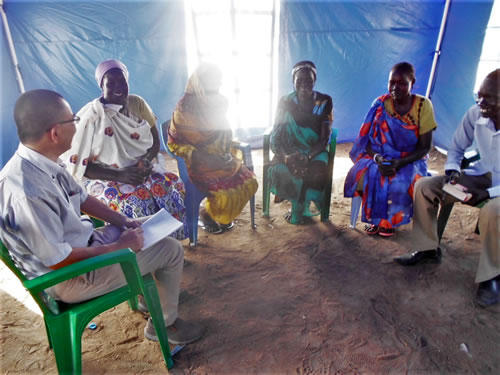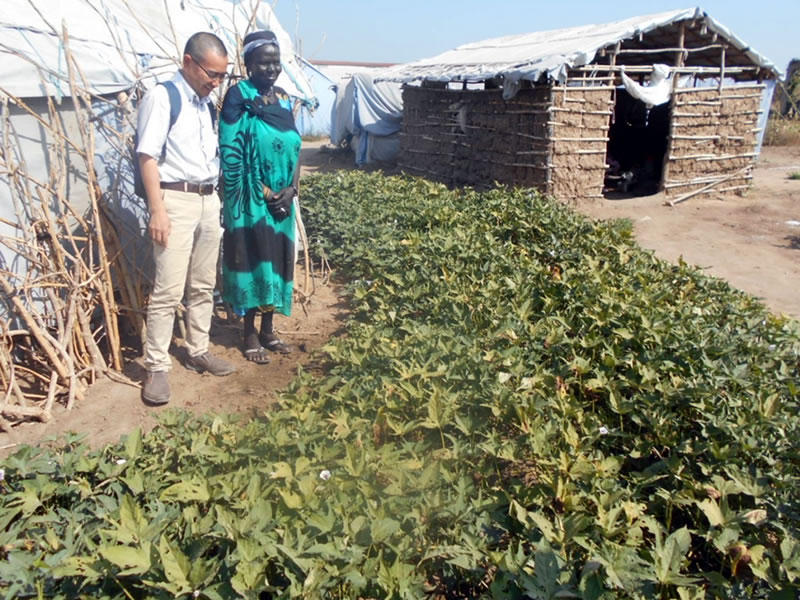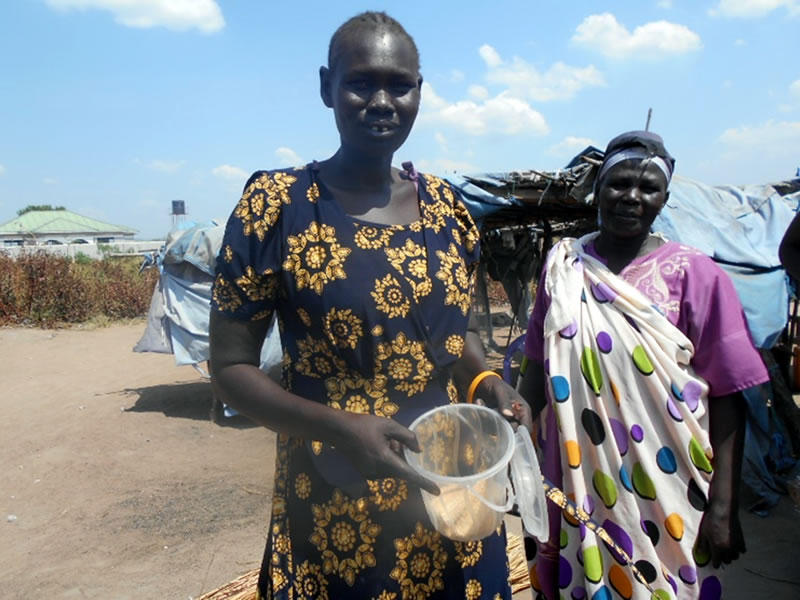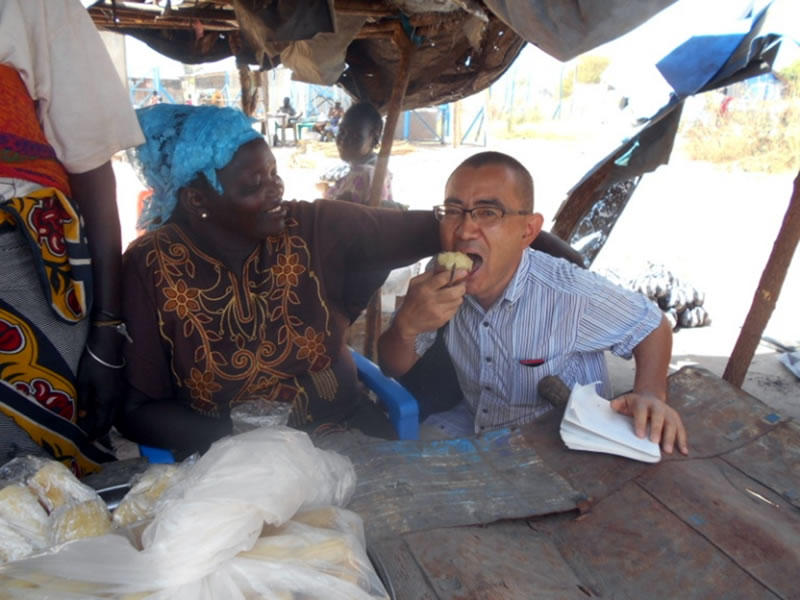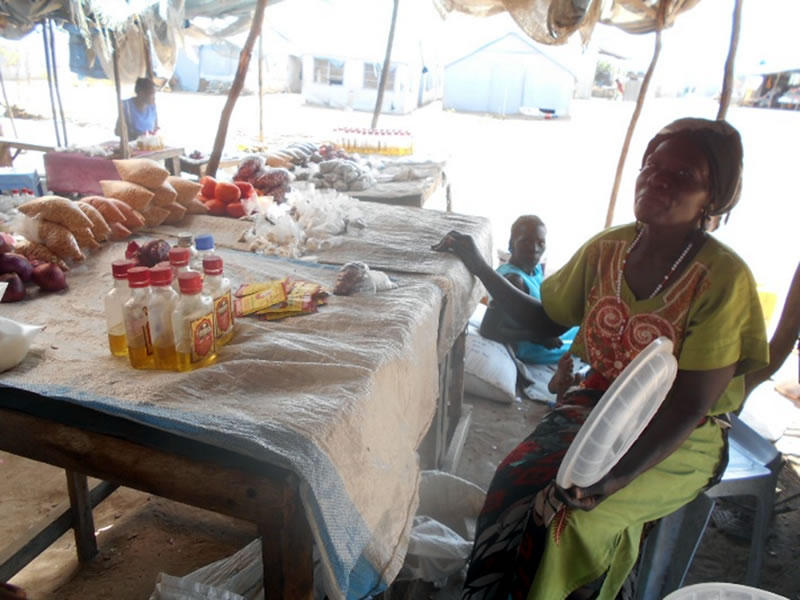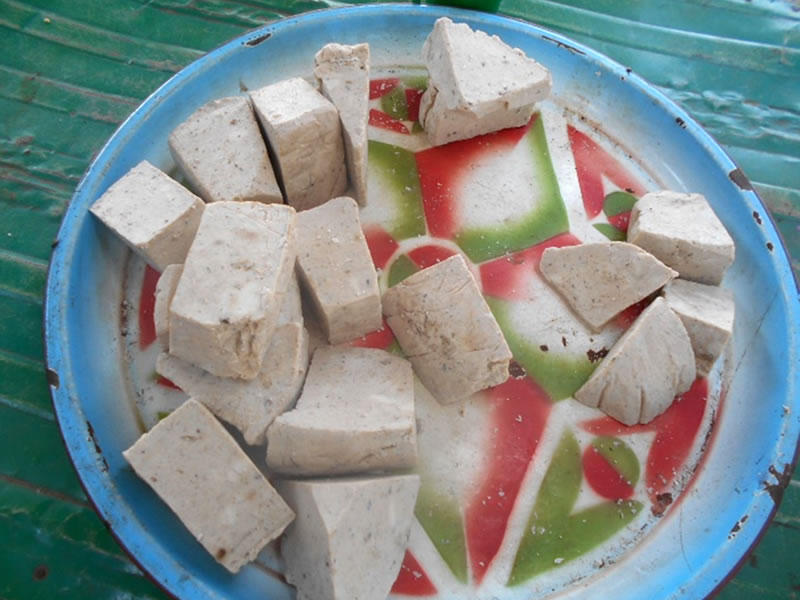– Interview to women in the camps –
[Original by Takaki IMAI, Manager for Humanitarian Assistance and Peace-Building Group (February 28, 2018); Translated by K. Adachi]
The 10th day: 2nd of December (Saturday)
Discussion with refugee women in Mangaten Camp 1
In this trip, we are planning to have a discussion aiming for the support of improvement of living conditions as well as the implementation of support for entering school. First of all, we visited Mangaten Camp 1 and conducted the following discussion with 5 women.
<How to procure the food?>
First of all, we asked them whether there is food for today and tomorrow in the tent, and how they obtain food everyday. The answers from the five women were almost identical, saying, “We have almost no food, but the rice in the bag provided by China last month still remains and we eat that.”
‘The rice from China’ surprised me. The relief supply appears to be delivered from China through South Sudan government. However the food distribution is not conducted regularly and the distributed food will soon be no longer available. When I asked them how they get food in case they didn’t have any on their hands, and they replied, “We go to the big refugee camp in Juba (United Nation refugee protection shelter) and our relatives who live there share with us.”
<What about cash income?>
Although cash is needed to buy sugar, clothes, sandals, and other necessities to make a living, they said, “Because most of the women in the camp lost their husbands in the conflict, they live only with mothers and children. They have no work and own nothing.” They said that even if they find a daily paid job and work for a whole day, the payment doesn’t even cover the cost of food for one day. And they cannot become a Tea Lady (sell tea on the street) because capital investment is necessary. When they need cash, women whose relatives live far away sometimes send money, while on the other hand another woman said, “Those whose relatives don’t send money must live with what they have in the tent, without buying anything.” There are many people who don’t have anything to rely on.
<Vegetable cultivation>
I wondered, do they really only rely on distributed food and gifts from relatives? As we talked about daily meals, they started talking about, “Side dish is boiled okra” or “We ate sweet potato yesterday.” I asked them, “Where did you buy this from?” since these foods are not included in the distributed food. Everyone replied, “We don’t buy.” They are not buying because they are producing by themselves. There are spaces between each tent in Camp 1, where a wide variety of homemade vegetable gardens are being cultivated. When I asked, “Do you sell harvests?” they answered that “very little remains to be sold in the market after the family has eaten.”
The conversation became lively as I asked them what they were growing. They cultivate okra, eggplant, cabbage (Sukuma Wiki), peanuts, maze, sorghum, beans, sweet potato, pumpkin, hibiscus, just to name a few. They told me that they had asked the missionary relief organization in charge of the camp’s nursery school and were granted seeds and agricultural tools. However, the number of the agricultural tools is not enough, and the ones they have are shared between several people. I heard someone says that more vegetables can be cultivated if there are more tools. Irrigation tools are required when it doesn’t rain a lot. Various people said, “We can dig a pond close to the camp but it is hard to move the water from there. If there were plastic tanks and handcarts, we can transport more water and the field could be expanded,” and “If there was a watering can, a small amount of water can be sprinkled all across the field.”
If the amount of vegetables and crops cultivated by those living in the camp increased, they would not have to depend on the food distribution. The support for improvement of living in Camp 1 is almost automatically decided to be the support of vegetable gardens.
The 12th day: 4th of December (Monday)
[We are reporting about the 12th day because the 11th day was holiday.]
Visit DMI office (Gray district)
I went for a greeting with DMI, the missionary organization operating the elementary school, and had a meeting with Mr. Renzis, who is in charge of education support, about the distribution of school supplies in Mangaten Camp 1. DMI praised the distribution of school supplies by JVC, saying that it is necessary for children to study and they are happy for it. Although DMI did construct the school building and hired the current teachers, it doesn’t currently give out school supplies. The school enters into the Christmas holidays in December and the new semester starts in the middle of January. The distribution of school supplies was decided to be performed in January after new semester starts.
Discussion with refugee women in Mangaten Camp 2
We started a discussion with several women gathered in the shade of trees in Camp 2. While we were having the discussion, the number of people surrounding us gradually increased.
Although voices appealing the current issues such as the shortage of food or the improvement of sanitation were raised, the purpose of the visit this time was not for the distribution of food and sanitary products. It is to think what JVC can do so that refugee families will be able to obtain food or earn income on their own.
When I asked about what they do to obtain cash, there were people who cultivated vegetables. They sell their harvests in a small market within the camp. However it was different from Camp 1 in that there is only a very tiny space to make vegetable gardens in Camp 2, where tents are densely crowded.
They mentioned about other measures to obtain cash that “if they attempt to do day labor outside the camp, there is either no job available, or if they do find a job, the daily payment is too low”, “although everyone thinks that it would be great if they could do their own small businesses, it is difficult because they have no capital.”
However, as I asked them whether there was no one who is doing own business in the camp, it turned out that this was not the case at all. Somebody said, “I know a person called Graise, who is baking fried breads and cookies and selling them.” Then they started pointing out fingers and saying to each other “that person is baking cookies”, “You are working as Tea Lady too” and the actual examples of small businesses were coming to light one after another. In reality everyone seems to be doing a lot.
When I returned, about 20 women had gathered and there were several people who had a small space in the market and had a retail sales business. Ms. Royce who was among them was saying as follows:
“Only waiting to receive the goods from the relief organization is not good enough. We want to do something by ourselves. If we can earn money by ourselves, we don’t have to wait forever.”
Hearing stories, it is said that the small businesses by women are mostly being conducted inside the small market within the camp. As I visited the market, there were various shops such as sales of recycled soaps, created by gathering fragments of soaps and Tea Ladies, as well as food groceries such as vegetables, oils, and cookies.
The visit this time showed several actual activities for making a living and the various sources of cash. We have to consider how to support these activities and how to make more women participate.
Next time I will report about the status of the distribution of school supplies.
Share This:
